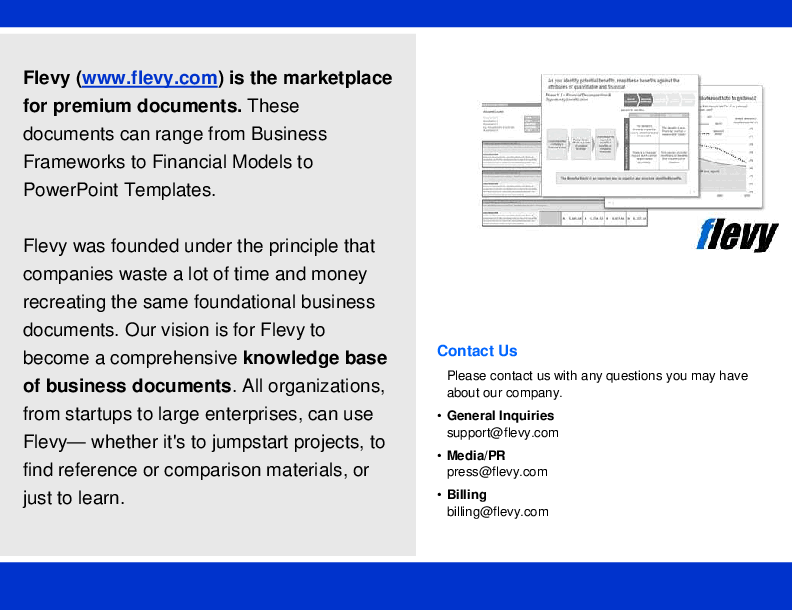BENEFITS OF THIS PDF DOCUMENT
- Evaluate both internal and external capabilities of the business by analyzing the entire value chain during and after a disruptive event that provides strategic themes on the impact of the event on the business' profit margins
- Provide a comprehensive assessment of how specific resources and capabilities that are used to create value are impacted by the disruptive event due to contractual relationships.
- Create a detailed strategy on recovery and turnaround during such disruptive events
COVID-19 PDF DESCRIPTION
When there is a disruptive event, such as the Covid-19 crisis, contractual agreements are impacted and affect a business' ability to produce goods or services. Contracts are a tangible, critical source of a business' capabilities that affect the business's value chain. Most businesses are not aware how to live on the edge of chaos and have to adapt, pivot and move forward in such times.
This document is a strategic framework designed to analyze the Value Chain, stakeholder relationships and many more areas during and after the disruptive event using a grid to assess the costs and revenue of the value chain. The value chain can be properly evaluated and provide a comprehensive understanding of how the business' value chain is impacted during a disruptive event. This allows businesses to revisit and redesign their business strategy accordingly.
The toolkit is designed to leverage off the strategic foresight model and has been used with well over 30, 000 clients who have reported back on its applicability to assist them model a success repeatable model in their business units.
The strategy helps companies address the below challenges:
Evaluate short-term liquidity. Companies will want to instil short-term cash flow monitoring discipline that allows them to predict cash flow pressures and intervene in a timely manner. They'll also want to maintain strict discipline on working capital, particularly around collecting receivables and managing inventory build-up. Additionally, it's important to be creative and proactively intervene to lighten the working capital cycle. Throughout the crisis, companies will want to maintain regular contact with suppliers to identify any potential risks.
Assess financial and operational risks and respond quickly. Companies will need to monitor direct cost escalations and their impact on overall product margins, intervening and renegotiating, where necessary. Companies that are slow to react or unable to renegotiate new terms and conditions may be vulnerable to financial stress that could carry long-term implications.
Just as companies need to monitor their in-house vulnerabilities, they also will need to monitor the pressures that may be impacting some of their customers, suppliers, contractors or alliance partners. In particular, companies will want to stress test any tier one and tier two suppliers that may be impacted. This is especially important for sectors such as automotive and pharmaceutical, which are highly dependent on third-party suppliers. Finally, be aware of covenant breaches with banking facilities and other financial institutions relating to impairment risks in asset values, which may impact the health of the overall balance sheet.
Consider alternative supply chain options. Companies that source parts or materials from suppliers in areas significantly impacted by COVID-19 will want to look for alternatives. For example, a Japanese industrials manufacturer is considering moving the assembly of commercial air conditioners to Malaysia from the Hubei Province capital of Wuhan, which remains under lockdown. Similarly, a global apparel company is looking to move production of its products from facilities in Wuhan to Vietnam and Indonesia. Such quick moves will create temporary capacity to meet customer obligations. Companies that have arrangements with agile manufacturing facilities to make spot buying decisions, or have loose contractual arrangements with various service providers and logistics providers, should consider the initial disruption as well as post-crisis scenarios given the potential for demand spikes.
Got a question about the product? Email us at support@flevy.com or ask the author directly by using the "Ask the Author a Question" form. If you cannot view the preview above this document description, go here to view the large preview instead.
Source: Best Practices in COVID-19 PDF: Stategic Foresight COVID-19 Return to Work Toolkit PDF (PDF) Document, GBSH Consult Group





